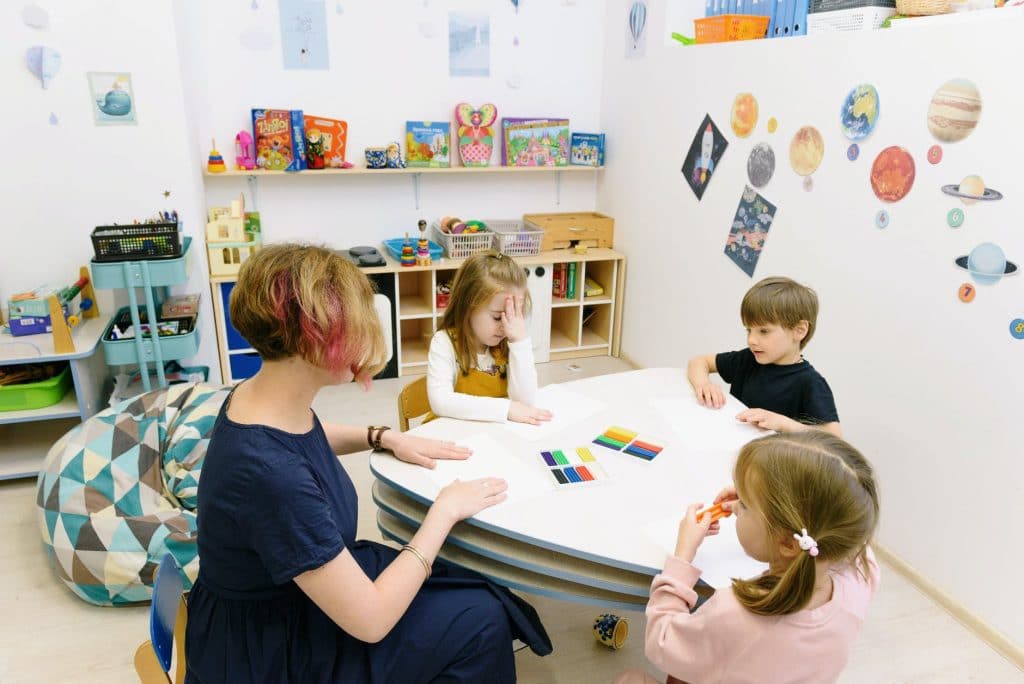Understanding Social-Emotional Development of Preschoolers

In the preschool years, children experience a wide range of emotions- both positive and negative – related to their current situations and experiences. As they move through this age period they will gradually learn to recognize, name, and appropriately express their own feelings and those of others, experience empathy more frequently and in more situations, and come to understand who they are and how they are similar to and different from their peers.
Three-year-olds tend to have a rich fantasy life. THey act out different roles, assign emotions to dolls and toys, and may stay in the pretend role during routines at home and at the program. They enjoy the sense of control that comes from controlling their fantasies – where their imaginations take them. Some three-year-olds have one or more imaginary friends who are part of their lives for a bit.
Three year olds are still learning how to separate thoughts from actions, so self-regulation is a challenge. They may want to ride a bike one minute and see their friend playing on the scooter and want the scooter then go and grab it from their friend. Young preschoolers do not hold back. If they feel happy, they express it. If they want something then they take it.

Some three-year-olds lose control- they may have tantrums or laugh uncontrollably. Fears are common, and typically irrational, such as asking to have a light on at night. They can handle minor disappointments and frustrations. but often seek adult help to manage intense emotions. Three-year-olds notice and identify with other children’s distress. When a playmate falls and cuts their knee, a child will hurry to get the teacher to help. At this age, children are aware of their own physical and behavioral characteristics and compare themselves to others. They now are clear that other people have feelings too and are more often empathetic than in the past.
By age four, many children are developing a sense of humor. They tell the same jokes again and again, finding each retelling as hilarious as it was the first time. They tend to be less fearful, understanding now that dreams are not real. They become more aware of individual characteristics and compare themselves to others. They now are clear that other people have feelings too and are more often empathetic than in the past.
Although adults are important sources of comfort, four year olds pay attention to and apply the emotion management strategies suggested by adults. They might squeeze a foam ball, take deep breaths, or sit in the corner on one of the bean bag chairs for a while. They now notice and experience more subtle or complex emotions, such as feeling embarrassed or worried.

Four-year-olds are gaining both a sense of self and a healthy self-concept. They can describe themselves in greater detail and include interests and skills in addition to physical characteristics. They show a sense of belonging to the group, their family, and their communities. During group times or in smaller gatherings they share their ideas and opinions, often telling others about their accomplishments.
By the time they turn five and are nearing the end of their time in a preschool setting, children have made great strides in being able to control impulses. The result is that tjeu cam feel something without acting on it. Most five-year-olds can use words to express themselves and delay gratification while waiting for a turn or for lunch to arrive. They are unlikely to use aggression to get what they want or epresss anger or hurt feelings.
Five year olds can identify and describe their unique characteristics. Included are interests, talents,and skills along with culture, home language, family, and race. They may say positive things about themselves such as “I am a good friend” or ” I worked hard on my picture.”
The link below shows multiple videos of social emotional tools for preschoolers. Feel free to look at the videos for great tips!
https://www.unicef.org/northmacedonia/learning-social-and-emotional-skills-pre-school
